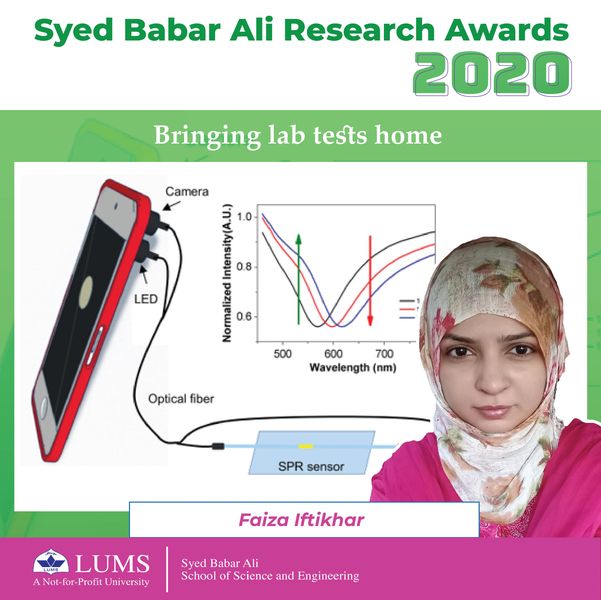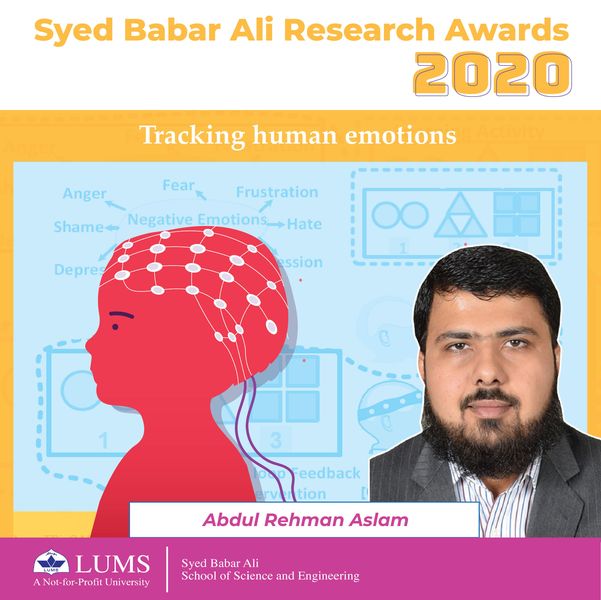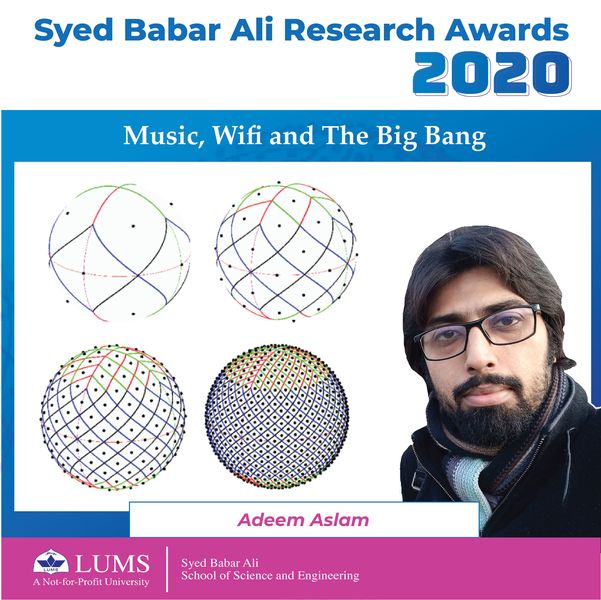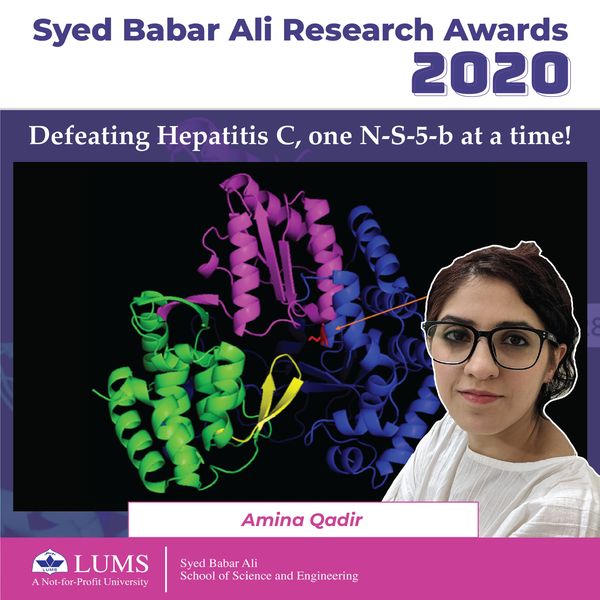Syed Babar Ali Research Awards
This award is sponsored by the Babar Ali Foundation.
The Syed Babar Ali (SBA) Research Awards Program recognizes and supports potentially high-impact work being carried out by current PhD students in the Syed Babar Ali School of Science and Engineering, LUMS. The recipients of this award are expected to pursue research and scholarly activities that support knowledge creation and innovation in science and engineering as well as contribute to the economic well-being of society at large. As part of this prestigious programme, the awardees benefit from a monthly stipend as well as additional research support (for example, for procuring equipment, consumables, covering research travel expenses, publication fee for journals etc.) from a central fund exclusively allocated for this program. The award is sponsored by the Babar Ali Foundation.
As part of this prestigious programme, the winners benefit from a monthly stipend of PKR 50,000 in addition to the stipend contribution from their PhD supervisors. Moreover, they are eligible to apply for additional research support (for example, for procuring equipment, consumables, covering research travel expenses, publication fee for journals etc.) from a central fund exclusively allocated for this program as discussed below.
Please click here to get more information about eligibility criteria, the application process and other rules.
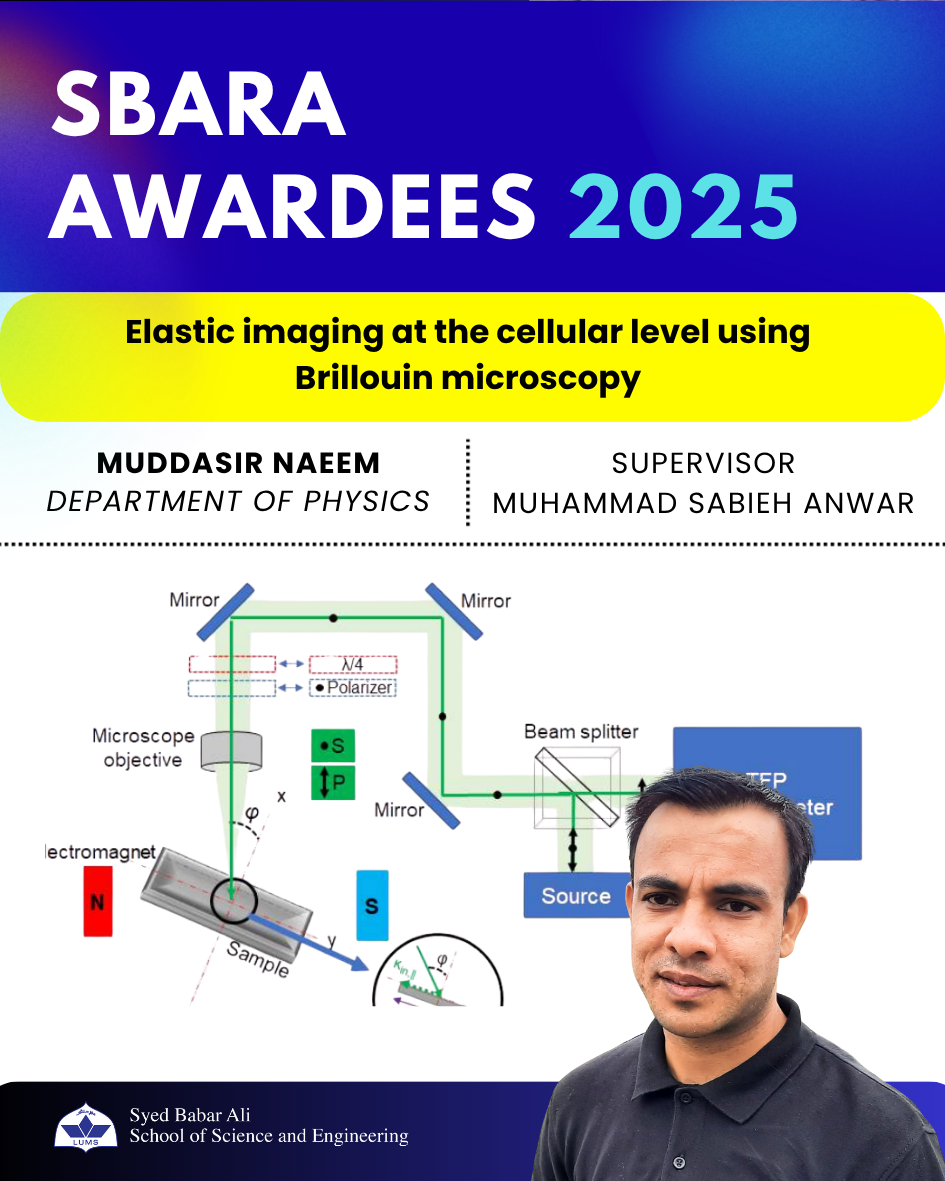
Elastic imaging at the cellular level using Brillouin microscopy
Student: Muddasir Naeem
Supervisor: Dr. Muhammad Sabieh Anwar
Department of Physics
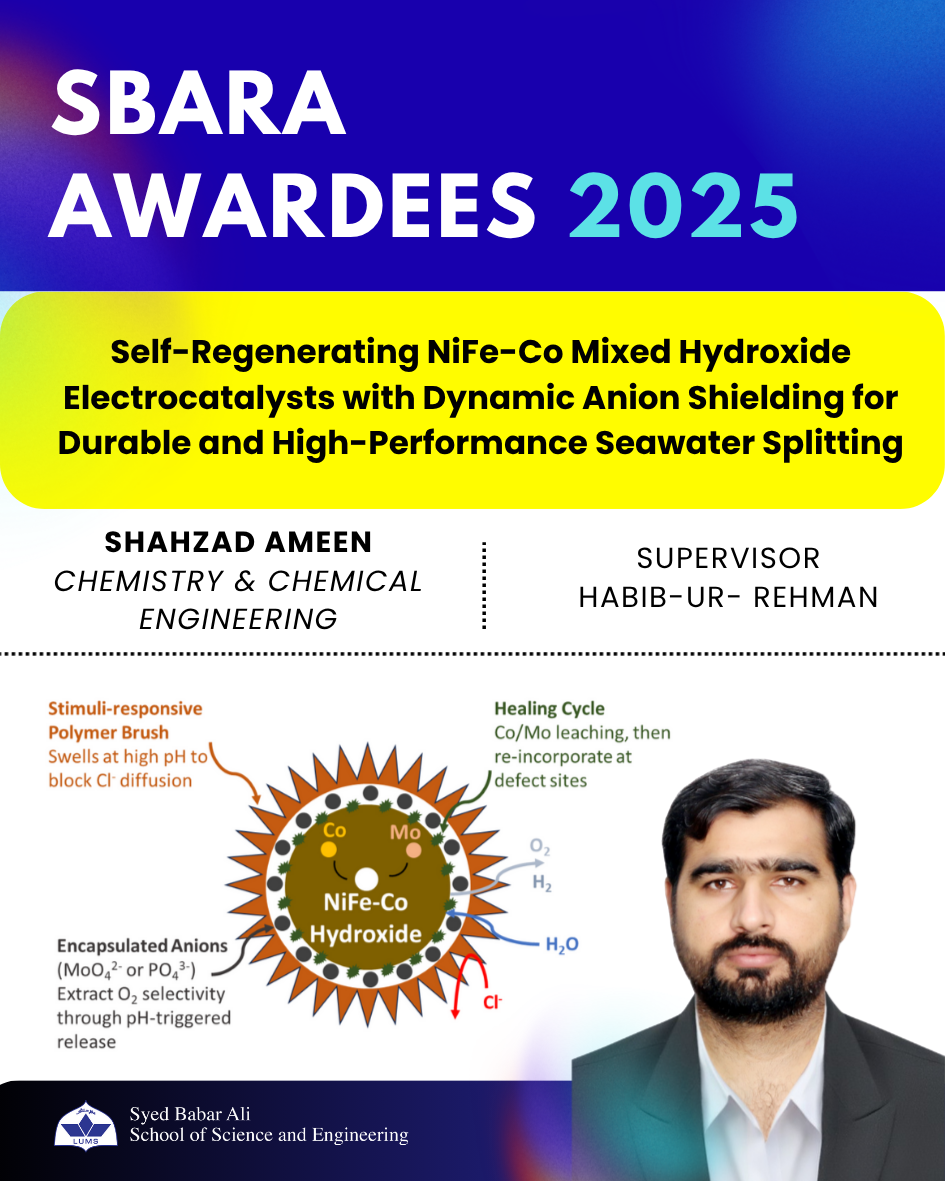
Self-Regenerating NiFe-Co Mixed Hydroxide Electrocatalysts with Dynamic Anion Shielding for Durable and High-Performance Seawater Splitting
Student: Shahzad Ameen
Supervisor: Dr. Habib-Ur-Rehman
Department of Chemistry and Chemical Engineering
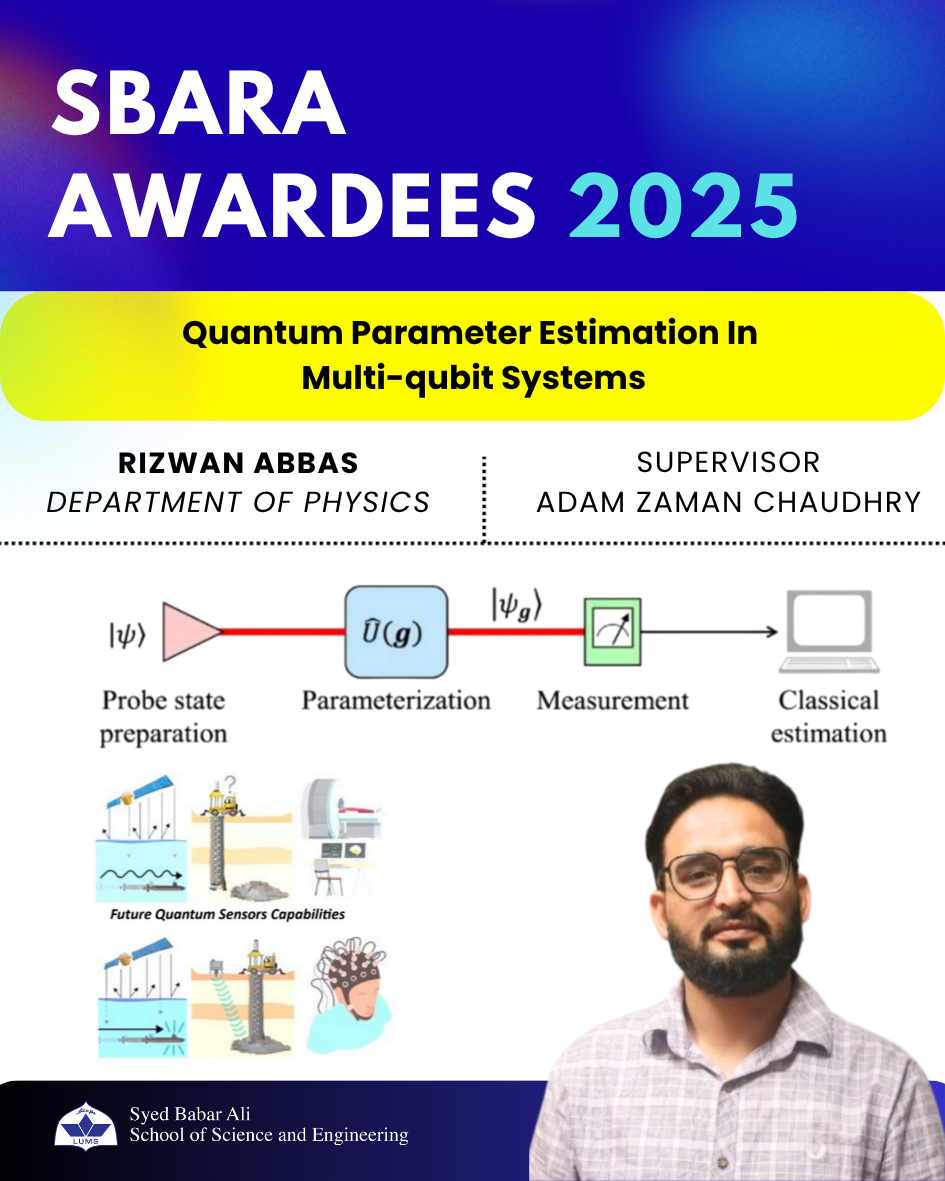
Quantum Parameter Estimation In Multi-qubit Systems
Student: Rizwan Abbas
Supervisor: Dr. Adam Zaman Chaudhry
Department of Physics
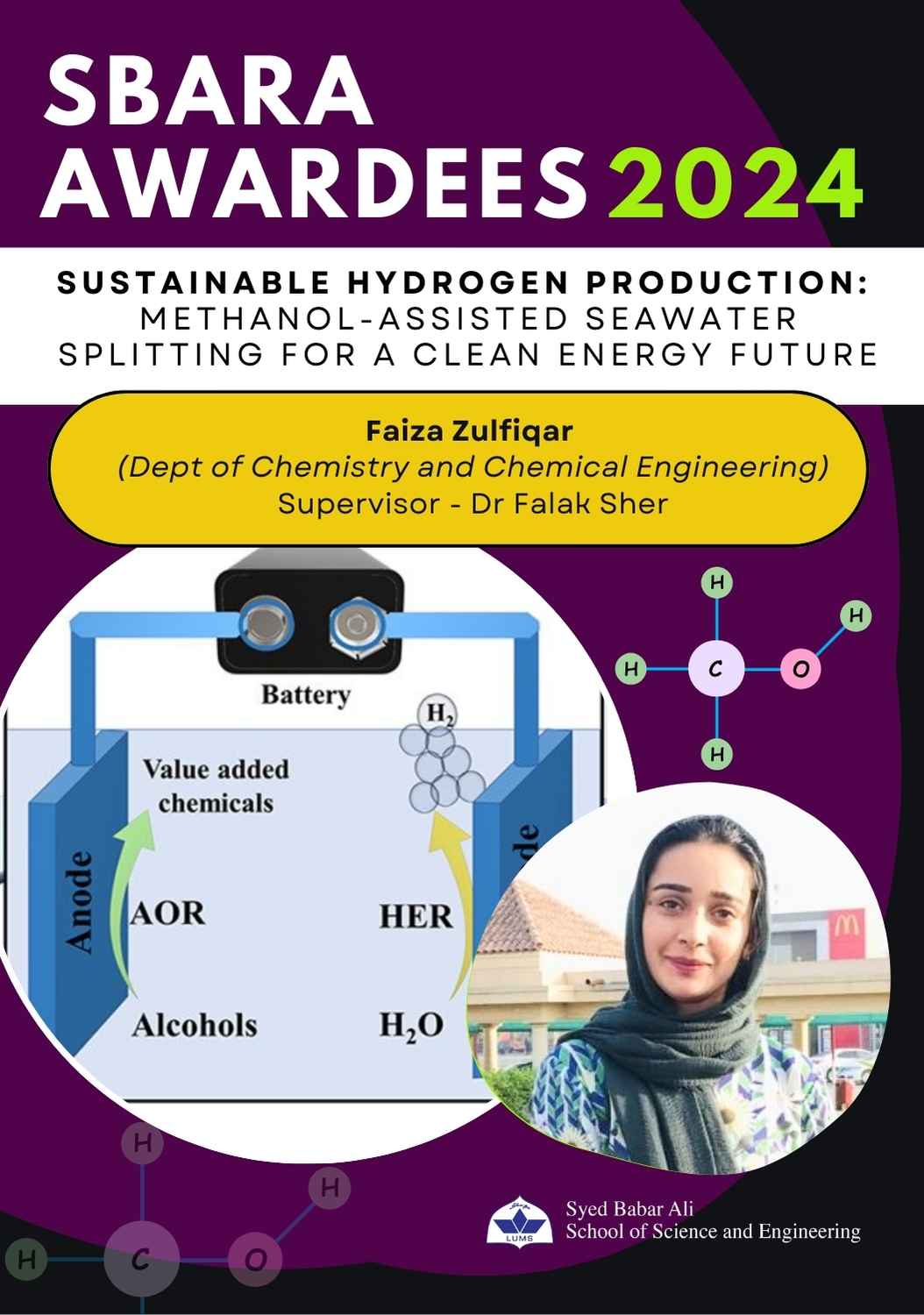
Sustainable hydrogen production: Methanol-assisted seawater splitting for a clean energy future
Student: Faiza Zulfiqar
Supervisor: Dr. Falak Sher
Department of Chemistry and Chemical Engineering
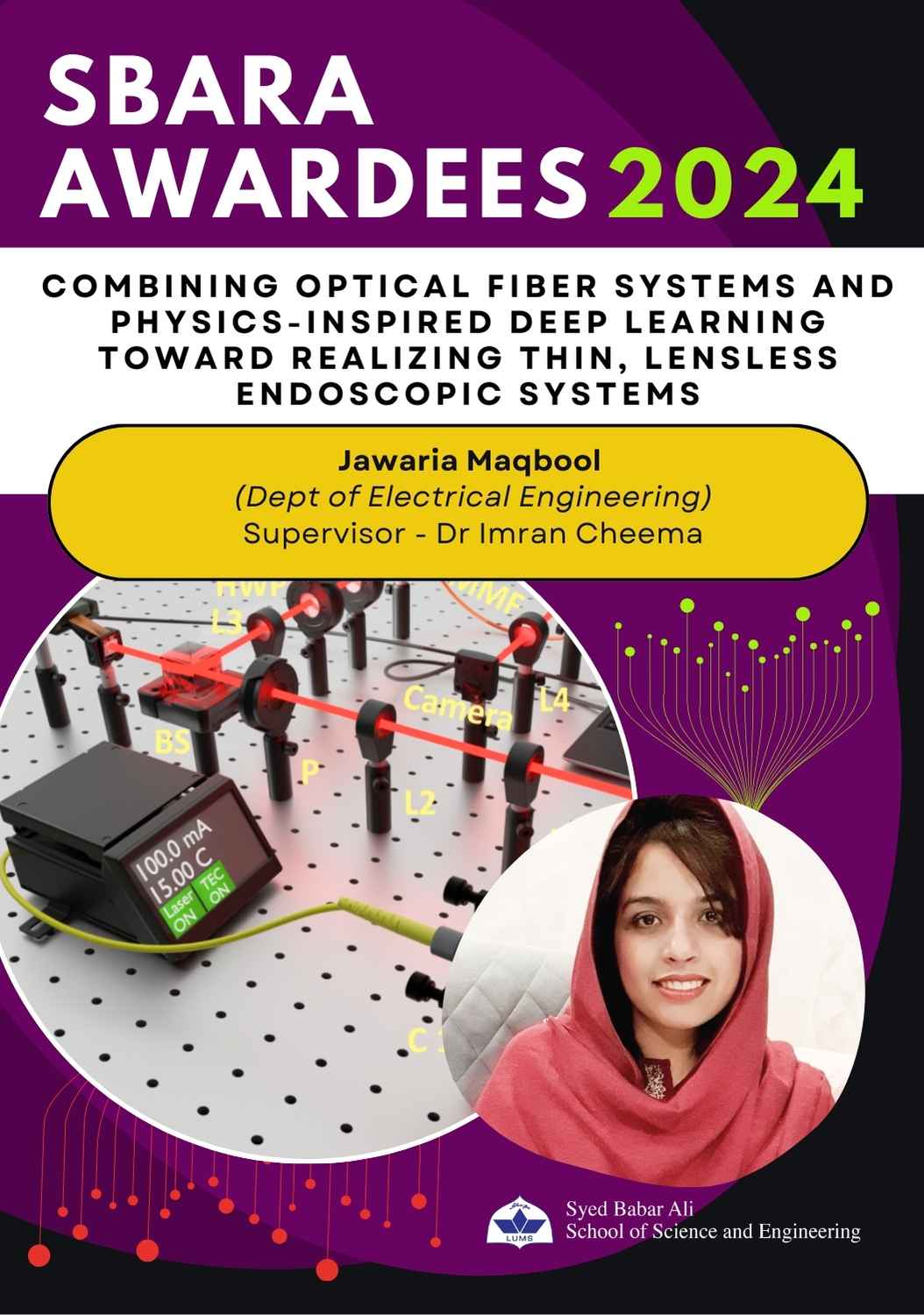
Combining optical fiber systems and physics-inspired deep learning toward realizing thin, lensless endoscopic systems
Student: Jawaria Maqbool
Supervisor: Dr. Muhammad Imran Cheema
Department of Electrical Engineering
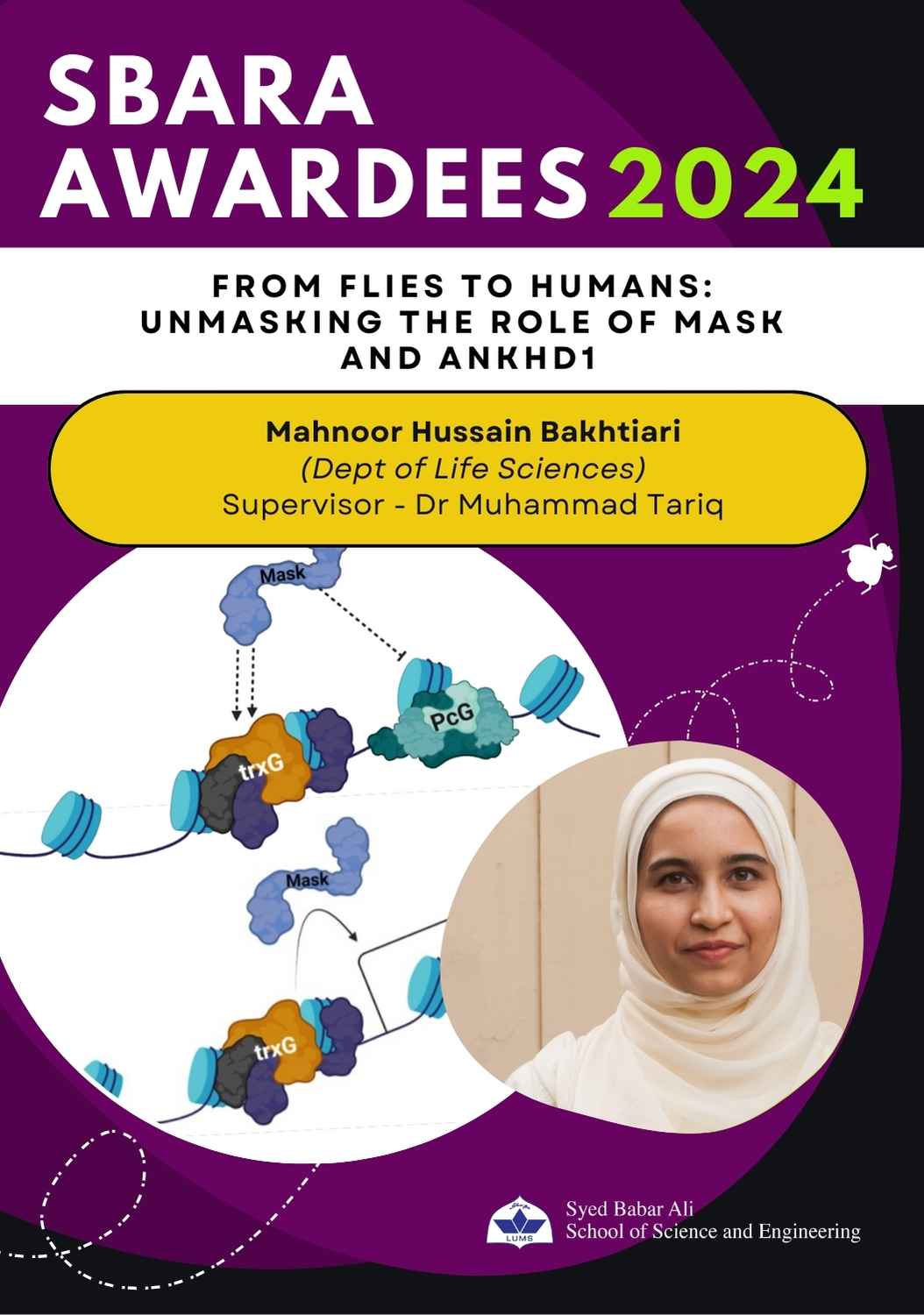
From flies to humans: unmasking the role of Mask and ANKHD1
Student: Mahnoor Hussain Bakhtiari
Supervisor: Dr. Muhammad Tariq
Department of Life Sciences
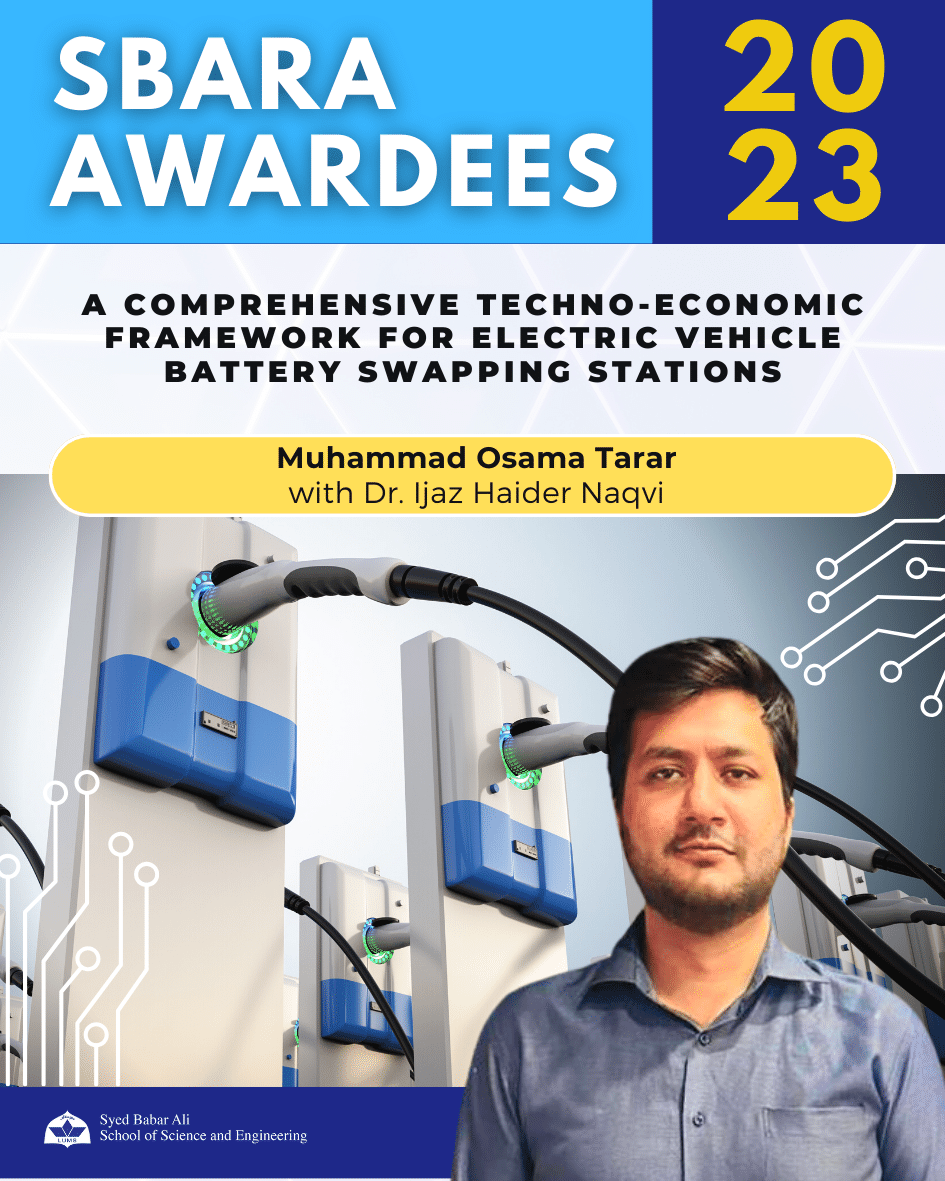
A Comprehensive Techno-economic Framework for Electric Vehicle Battery Swapping Stations
Student: Muhammad Osama Tarar
Supervisor: Dr. Ijaz Haider Naqvi
Department of Electrical Engineering
Muhammad Osama Tarar’s research proposal aims to create a comprehensive framework for Electric Vehicle Battery Swapping Stations (BSWS) to address the challenges of long charging times and high costs in electric vehicles. The project includes optimising battery swapping, predicting battery health, classifying Li-ion cells, and developing efficient charging policies to accelerate EV adoption and reduce carbon emissions.
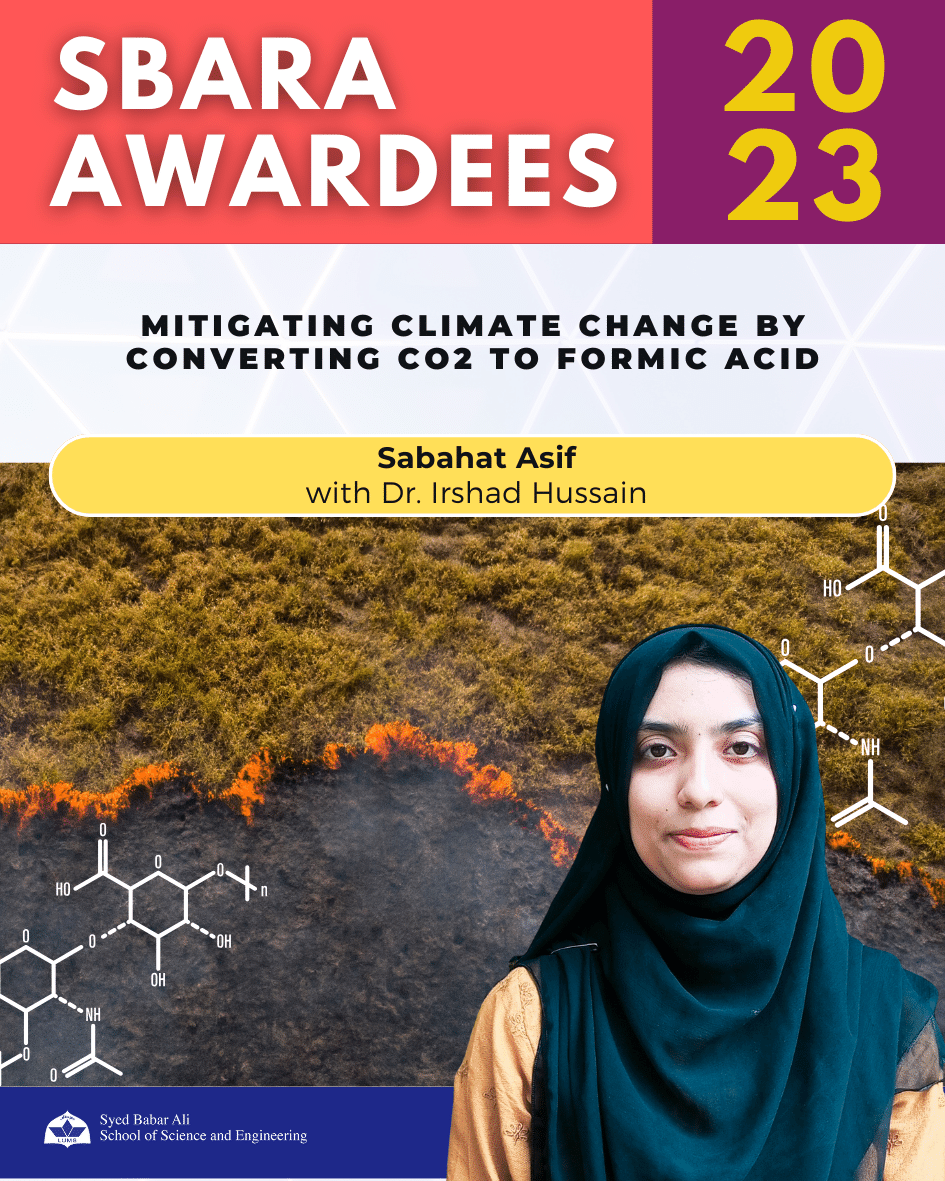
Mitigating Climate Change by Converting CO2 to Formic Acid
Student: Sabahat Asif
Supervisor: Dr. Irshad Hussain
Department of Chemistry and Chemical Engineering
Sabahat Asif’s research aims to combat rising CO2 levels caused by fossil fuels through electrochemical CO2 reduction, focusing on converting CO2 into valuable formic acid. By designing cost-effective catalysts, including Sn-Pb/SnO2 composites, Sabahat aims to enhance efficiency, contribute to carbon reduction, and generate revenue from valuable chemical production, aligning with global efforts of climate change mitigation.
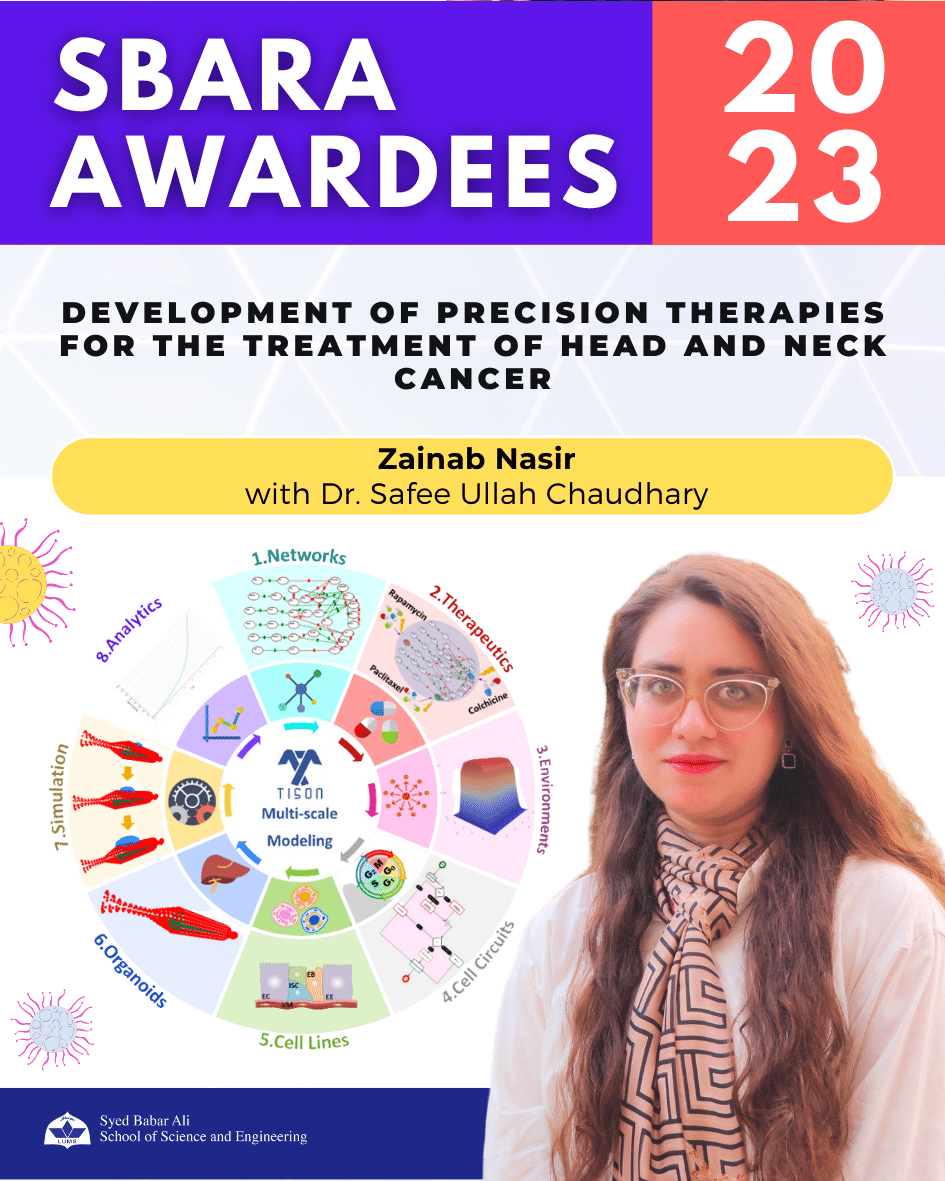
Development of Precision Therapies for the Treatment of Head and Neck Cancer
Student: Zainab Nasir
Supervisor: Dr. Safee Ullah Chaudhary
Department of Life Sciences
Zainab Nasir’s research tackles head and neck squamous cell carcinomas (HNSCC), a common cancer type with multiple risk factors. Existing treatments for HNSCC lack personalization, leaving many patients without effective options. To address this, Zainab proposes "Theatre for in silico Systems Oncology" (TISON), a versatile cancer modeling platform. TISON will develop a comprehensive biomolecular network model for HNSCC, integrating patient data for personalized therapies. The platform will be accessible to the broader research community, fostering collaboration and advancing cancer treatment. This research aims to revolutionize cancer therapy by leveraging in-silico modeling and individualized approaches, ultimately improving patient outcomes.
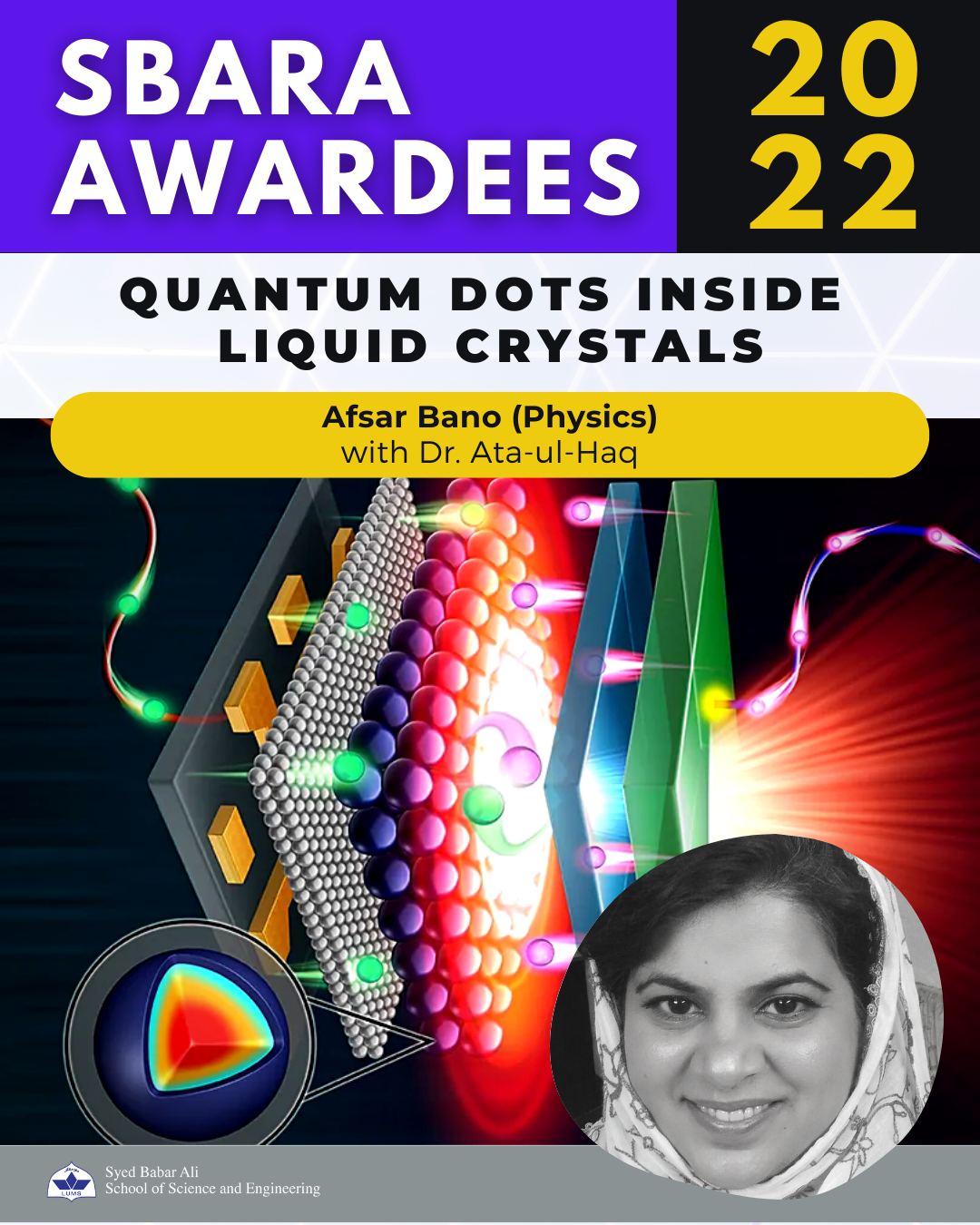
Quantum dots inside liquid crystals
Student: Afsar Bano
Supervisor: Dr. Ata Ul Haq
Department of Physics
How do we create efficient opto-electronic displays? Liquid crystals have been traditionally used as light emitting devices. But enter quantum technologies. Quantum dots can also act as light emitters. These dots are just like artificial atoms and emit light based upon the principles of quantum physics. Once you imbed these dots inside liquid crystals, it is hoped that the amount of light emitted per energy intake (i.e. efficiency) goes up when these hybrid devices are used. But making them with the desired properties is no mean feat. Syed Babar Ali Research Awardee Afsar Bano's work aims at welding quantum dots with liquid crystals for enhancing the sharpness and focus, brightness per unit energy input and robustness of the light emitting devices of the future.
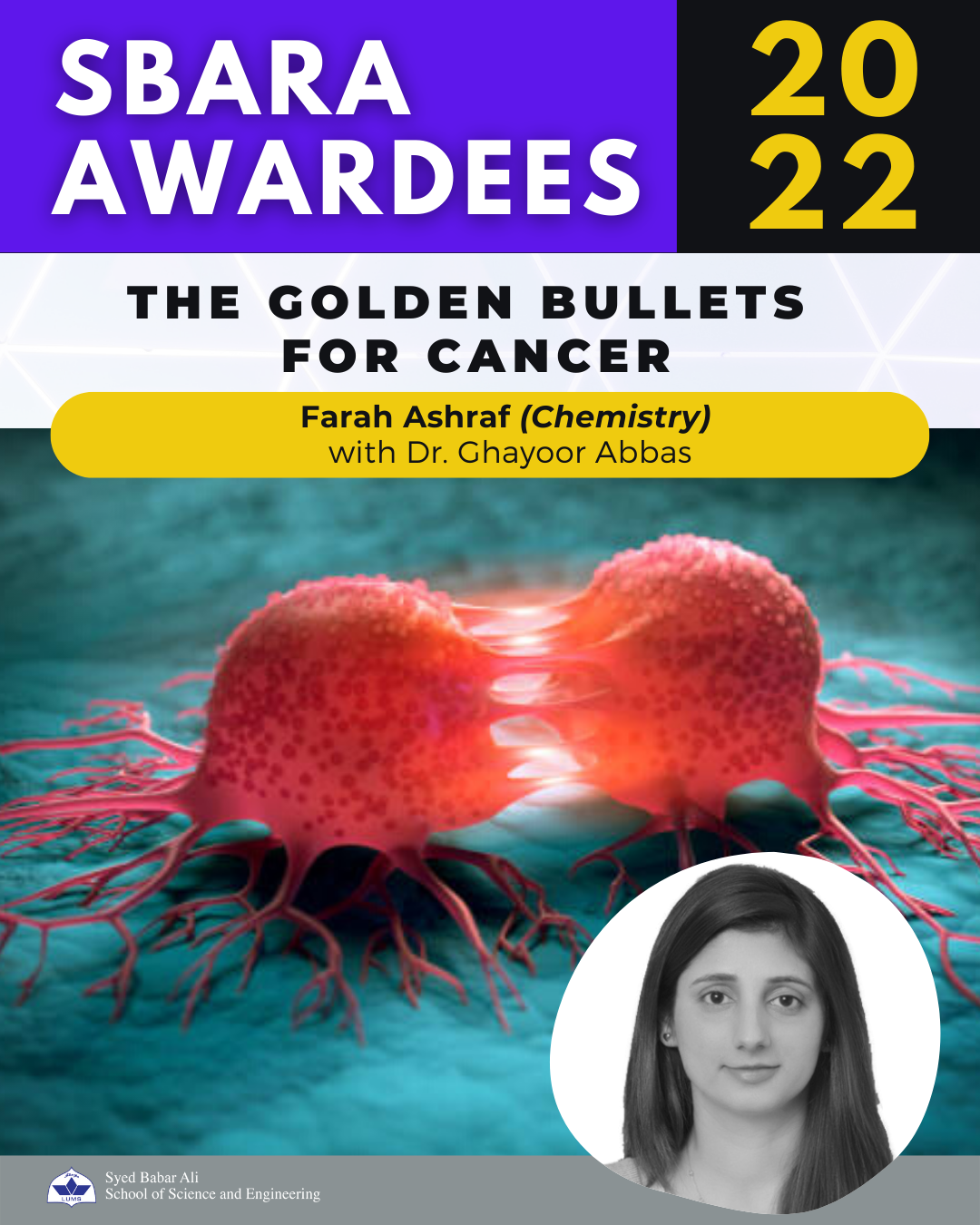
The golden bullets for cancer
Student: Farah Ashraf
Supervisor: Dr. Ghayoor Abbas
Department of Chemistry
Farah Ashraf's PhD research on anti-cancer therapeutics is two-pronged. She is exploring sulfonamide based derivative compounds for anti-cancer activity. Working with Dr. Ghayoor Abbas, she identified targets including Bcl-2 and AKT which trigger accelerated cell death. Unraveling the exact mechanism of how these sulfa drugs work can open doors to new lines of research activity. The second course of action is designing gold-based complexes that show anti-cancer properties and are also less toxic, and more efficacious.
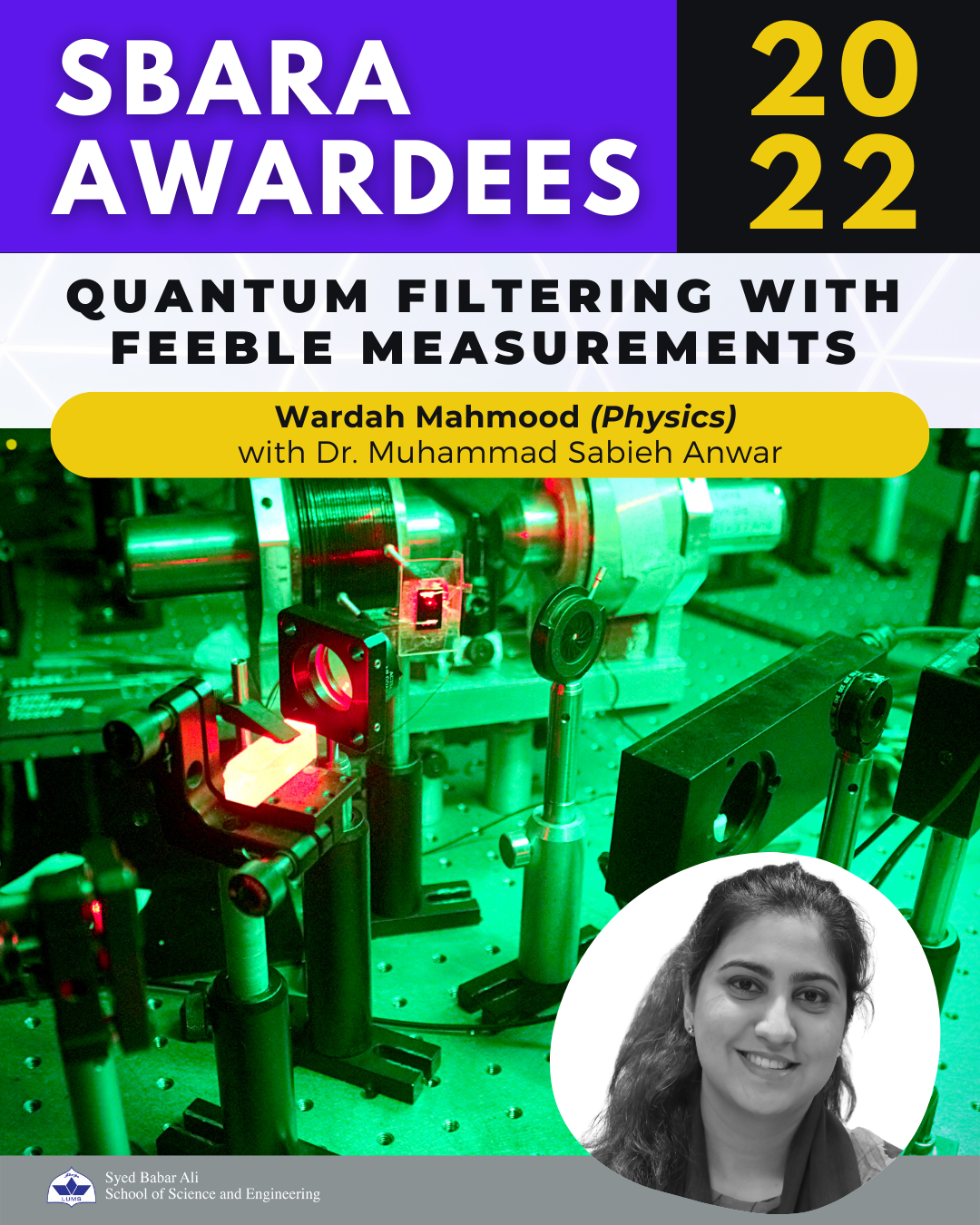
Quantum filtering with feeble measurements
Student: Wardah Mahmood
Supervisor: Dr. Muhammad Sabieh Anwar
Department of Physics
The uncertainty principle sets the limit on what can be seen, no matter how sophisticated (and expensive) your instrument is. The true properties of a quantum object can never be fully determined. Microscopes cannot resolve finer and even finer details. These are some of the sobering injunctions of quantum mechanics. But there is a way around too! With extremely feeble probing in a technique called weak value measurement, one can entangle the system with a measuring device and find large changes in the device that bypass the limitations mentioned above. Wardah in physics is precisely using these techniques, on the experimental optics bench, to filter and amplify really tiny magnetic and spintronic effects in novel devices, just like finding the needle in the haystack.

Enhanced thermal and moisture stability of the emerging PVs while using discotic liquid Crystals
Supervisor: Dr. Ammar Ahmed Khan
Department of Physics
Energizing solar cell technology
How strange does ‘flowing crystals’ sound? It seems at the heart of key scientific discoveries lie nature’s most well-kept secrets, tied up nicely with a bow of non-intuition; such is the existence of DLC i.e., discotic liquid crystals. Supervised by Dr. Ammar Ahmed Khan, Ms. Qurat ul Ain has worked with a next generation of materials that are more potent in catching and harnessing light to be converted into electricity, compared to contemporary technology. This leap of faith can be summed up into three words: perovskite solar cells.

Investigating the role of proteins in disease and their treatment with drugs
Supervisor: Dr. Safee Ullah Chaudhry
Department of Biology
Uncovering protein structures
Trillions of cells need a multi-trillion economy of well-kept proteins, safe metabolic environments, and reliable understanding of their complex interactions with drugs. Ms. Kanzal Iman, under supervision of Dr. Safee Ullah Chaudhry, proposes to uncover the structure of these important proteins, through developing better computer programs that do the heavy lifting by bypassing less efficient ways current software applications have in place. In other words, her project aims to develop software that works smarter, rather than harder. This will potentially unlock ways in understanding disease prevalence and eventually the drug interactions involved in treatment.
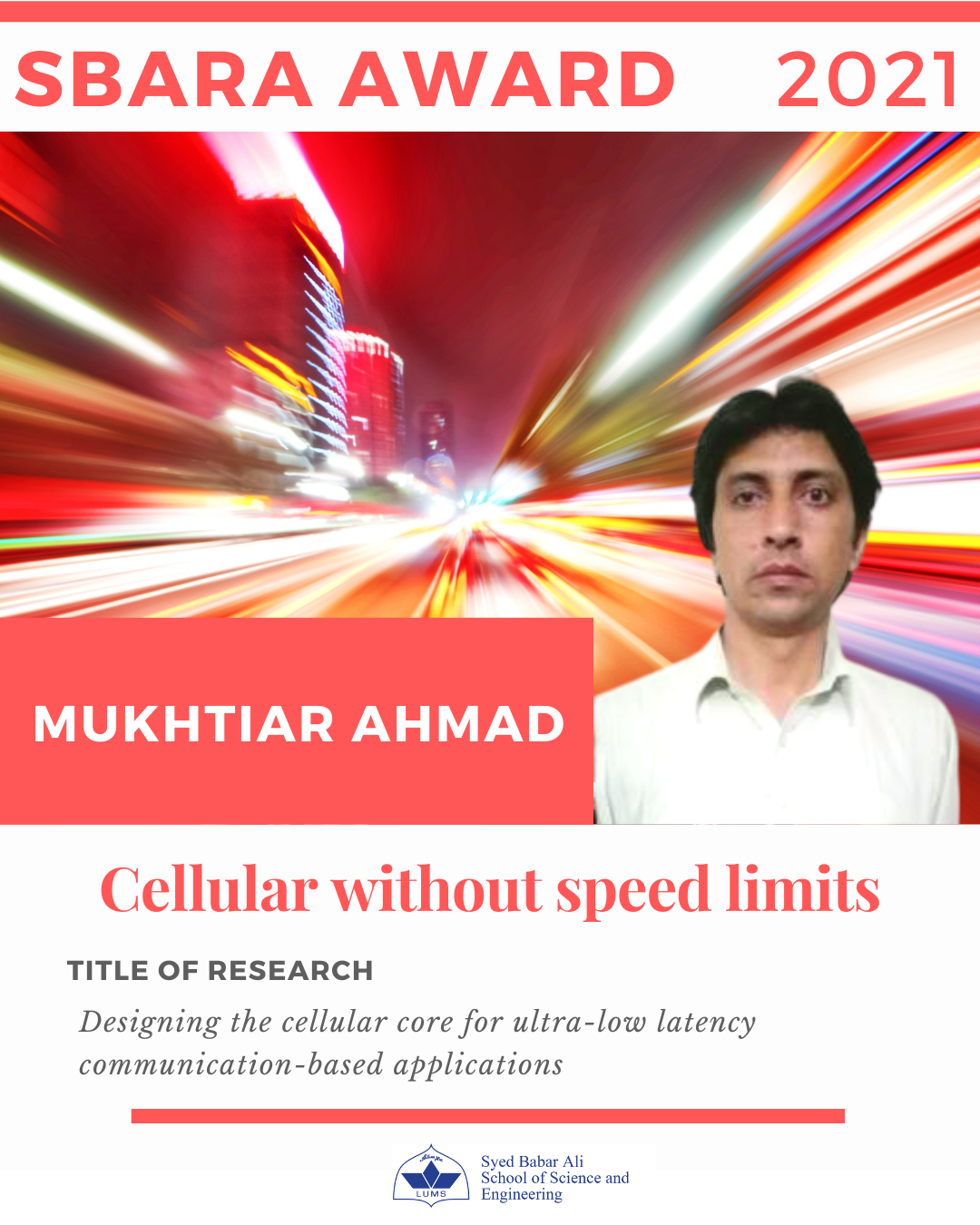
Designing the cellular core for ultra-low latency communication-based applications
Supervisor: Dr. Zafar Ayyub Qazi
Department of Computer Science
Cellular without speed limits
Can research rid the world of lag in communication technology? Mukhtiar Ahmad may have an answer! Supervised by Dr. Dr. Zafar Ayyub Qazi, Mr. Mukhtiar is working on thinking about cellular network systems from the ground up that can provide extremely low latency, enabling wide scale prevalence of mind-blowing technologies that may have a groundbreaking impact on many fields, ranging from medical science to online gaming. These applications require higher reliability and ultra-low latency, in the order of 10 ms. Mr. Mukhtiar Ahmad aims to re-design the cellular networks to support low latency communication-based applications.

Noninvasive Blood Glucose Monitoring System using Single Wavelength NIR Spectrometry
Supervisor: Dr. Wala Saadeh
Department of Electrical Engineering
The future of monitoring diabetes
Imagine measuring blood sugar levels without pricking any part of the skin. Ms. Aminah Hina’s project is all about developing a non-invasive blood glucose monitoring system. Although the product idea itself isn’t new. The market is saturated with portable gluco-meters and few companies even offer wireless blood glucose monitoring support. However, the caviat is their price – these devices are expensive! Ms. Aminah Hina, along with Dr. Wala Saadeh, propose a cheaper alternate. Pakistan is amongst the list of countries with highest prevalence of diabetes. Approximately 19 million Pakistanis have been diagnosed with diabetes in the year 2020. The research project of Ms. Aminah is poised to address this large fraction of Pakistani adults as well as some fraction of the Pakistani youth that suffers from both sub-types of the disease.

Evaluation of Protective Immune Response Induced by Pneumococcal Conjugate Vaccines (PCV-10) in Individuals with Type 2 diabetes
Supervisor: Dr. Shaper Mirza
Department of Biology
Easy breathing for diabetics
Diabetes is bad enough. Patients suffering this terrible illness have an additional risk of running into frequent respiratory tract infections. Since the immune response of the body is already attenuated in diabetics, the risk posed by additional infections is much greater than in healthy individuals. This is exactly where Mr. Izaz Ahmad’s proposal sprouts hope. Izaz Ahmad is studying the effects of a potent vaccine made for the bacterial culprit responsible for such respiratory disease – bacteria Streptococcus pneumoniae. His study will measure impact of the body’s immune response to PCV10 (the vaccine under investigation) in individuals with type 2-diabetes and figure out whether these responses are comparable between individuals with and without type 2-diabetes. The study will be the first to demonstrate efficacy and immunogenicity of pneumococcal conjugate vaccine in those with type 2-daibetes in Pakistani population.
Published work under SBARA funding:
Under the SBARA scholarship, the SBARA cohort of 2020 has successfully published the following articles:
1) A. Aslam and Z. Khalid, "Linear Transformations and Signal Estimation in the Joint Spatial-Slepian Domain," IEEE Signal Processing Letters, 2021, 28, pp. 1195-1199. DOI: 10.1109/LSP.2021.3086699
2) A. Aslam and Z. Khalid, "Spatial-Slepian Transform on the Sphere," IEEE Transactions on Signal Processing (Early Access)
3) A. R. Aslam, N. Hafeez, H. Heidari and M. A. B. Altaf, "An 8.62 μ W Processor for Autism Spectrum Disorder Classification using Shallow Neural Network," IEEE International Conference on Artificial Intelligence Circuits and Systems (AICAS), 2021, pp. 1-4, DOI: 10.1109/AICAS51828.2021.9458412
4) A. Aslam and Z. Khalid, “Overcomplete Multiscale Dictionary of Slepian Functions for HEALPix on the Sphere," submitted to IEEE Transactions on Signal Processing
5) A. Aslam and M. A. B. Altaf, " Machine learning-based patient-specific processor for the early intervention in autistic children through emotion detection,” Chapter 14, in " Neural Engineering Techniques for Autism Spectrum Disorder", Academic Press, 2021. https://doi.org/10.1016/B978-0-12-822822-7.00014-4 (Book Chapter)
6) A. R. Aslam, and M. A. B. Altaf, “A 10.13µJ/classification 2-channel Deep Neural Network based SoC for Negative Emotion Outburst Detection of Autistic Children,” IEEE Trans. Biomed. Circ. Syst. (TBioCAS), Accepted, Sep. 2021. DOI: 10.1109/TBCAS.2021.3113613.
7) A. R. Aslam, N. Hafeez, H. Heidari and M. A. B. Altaf, "An 8.62 μ W Processor for Autism Spectrum Disorder Classification using Shallow Neural Network," IEEE International Conference on Artificial Intelligence Circuits and Systems (AICAS), Washington DC, USA, 2021, pp. 1-4. (Conference)
Other Achievements:
Adeem Aslam was nominated for IEEE SPS Best Ph.D. dissertation Award 2021
Abdur Rehman won IEEE Circuit and System Society (CAS) Pre-Doctoral Achievement Award 2021, Daegu, Korea.
- https://ieee-cas.org/pre-doctoral-scholarship-2
- Cash Prize of USD 2500
Abdur Rehman also received Commonwealth Split-site Scholarship to support his twelve months research visit to Microelectronics Lab (MeLAB), University of Glasgow, UK.
- Research Grant of GBP 6000
- Conference Support

